How Antioxidants Help Lower LDL Cholesterol Levels

Antioxidant-Rich Food Intake Calculator
How Antioxidants Lower LDL
This calculator estimates potential LDL reduction based on your consumption of antioxidant-rich foods. Research shows diets high in antioxidants can reduce LDL oxidation by 5-10% when combined with heart-healthy habits.
Estimated LDL Reduction
Based on typical dietary studies showing 5-10% LDL reduction with high antioxidant intake
Your estimated LDL reduction is based on your current intake of antioxidant-rich foods. For best results, combine with regular exercise and a heart-healthy diet.
Tracking Tip: We recommend monitoring your lipid profile every 3-6 months to see how lifestyle changes affect your LDL levels.
Quick Takeaways
- Antioxidants can prevent LDL particles from oxidizing, a key step in plaque formation.
- Vitamin C, vitamin E, and polyphenol‑rich foods show the strongest evidence for modest LDL reductions.
- Combining antioxidants with a heart‑healthy diet and regular exercise yields the biggest impact.
- Too much supplemental antioxidant can interfere with some prescription drugs, especially statins.
- Track your lipid profile every 3‑6months to see how lifestyle changes affect LDL.
When a doctor mentions "bad cholesterol," most people picture a simple number on a blood test. In reality, the story involves tiny particles, oxidative stress, and the body’s defense systems. This article explains how antioxidants act on low‑density lipoprotein (LDL) and why that matters for heart health.
What Are Antioxidants?
Antioxidants are molecules that neutralize reactive oxygen species (ROS) and other free radicals, preventing damage to cells and tissues. Common dietary antioxidants include vitamin C, vitamin E, carotenoids, and plant‑derived polyphenols such as flavonoids and resveratrol. Their primary job is to donate an electron to a free radical, stabilizing it without becoming a harmful agent themselves.
Because oxidative stress is a major driver of LDL oxidation, keeping a steady supply of antioxidants in the bloodstream can slow down the conversion of harmless LDL into its atherogenic form.
Understanding Low‑Density Lipoprotein (LDL) and Why It Matters
Low‑Density Lipoprotein (LDL) is the primary carrier of cholesterol from the liver to peripheral tissues. When LDL levels rise, more cholesterol is deposited in arterial walls. The real danger appears when LDL particles become oxidized.
Oxidized LDL is taken up aggressively by macrophages, turning them into foam cells that form the core of atherosclerotic plaques. These plaques can narrow arteries, trigger inflammation, and ultimately lead to heart attacks or strokes-a condition grouped under cardiovascular disease.
Standard lipid panels report total cholesterol, LDL‑C, HDL‑C, and triglycerides. While HDL ("good" cholesterol) helps shuttle cholesterol away from arteries, LDL is the main focus when trying to reduce cardiovascular risk.
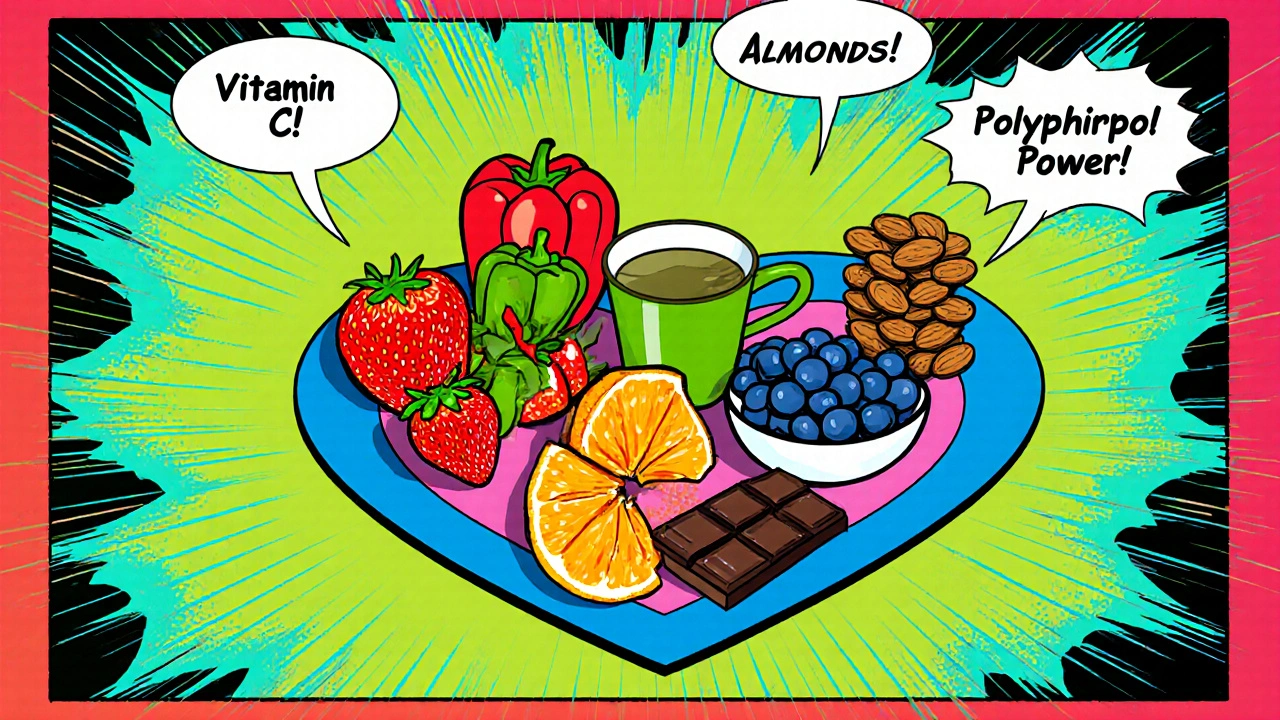
How Antioxidants Influence LDL Levels
The link between antioxidants and LDL works on three fronts:
- Preventing oxidation: By scavenging ROS, antioxidants keep LDL particles in their native, less harmful state.
- Modulating lipid metabolism: Some antioxidants, especially polyphenols, can influence enzymes like HMG‑CoA reductase, subtly lowering the amount of LDL the liver releases.
- Improving endothelial function: Better blood‑vessel health reduces the adhesion of oxidized LDL to arterial walls, slowing plaque buildup.
Research shows that people who consume antioxidant‑rich diets often have a 5‑10% lower LDL‑C compared with those eating low‑antioxidant foods, even when total calorie intake is similar.
Evidence from Clinical Studies
A 2023 double‑blind trial involving 200 adults with mildly elevated LDL reported that a daily supplement of 500mg vitaminC and 400IU vitaminE reduced LDL‑C by an average of 8mg/dL after 12weeks. The effect was more pronounced in participants who also increased their intake of polyphenol‑rich berries.
Another meta‑analysis of 15 randomized controlled trials (R‑CTs) found that flavonoid‑rich cocoa consumption lowered LDL‑C by 4‑6mg/dL and raised HDL‑C modestly. The authors noted that benefits were greatest when cocoa was low in added sugar.
It’s worth mentioning that antioxidant supplementation alone rarely replaces statin therapy for high‑risk patients, but it can complement medication and lifestyle measures.
Best Food Sources and Practical Tips
| Antioxidant | Key Food Sources | Typical Daily Dose (Food) | Observed LDL Effect |
|---|---|---|---|
| Vitamin C | citrus fruits, strawberries, bell peppers | 90mg (≈1 orange) | ≈3% reduction |
| Vitamin E | almonds, sunflower seeds, wheat germ | 15mg (≈¼ cup almonds) | ≈4% reduction |
| Polyphenols | berries, dark chocolate, green tea | 200mg (≈½ cup blueberries) | ≈5‑7% reduction |
| Carotenoids | carrots, sweet potatoes, spinach | 5mg (≈½ cup carrots) | modest, <1% change |
To make the most of these foods, aim for a colorful plate at each meal. Pair vitaminC‑rich fruits with iron‑containing foods (like beans) to boost absorption, and add a handful of nuts for vitaminE.
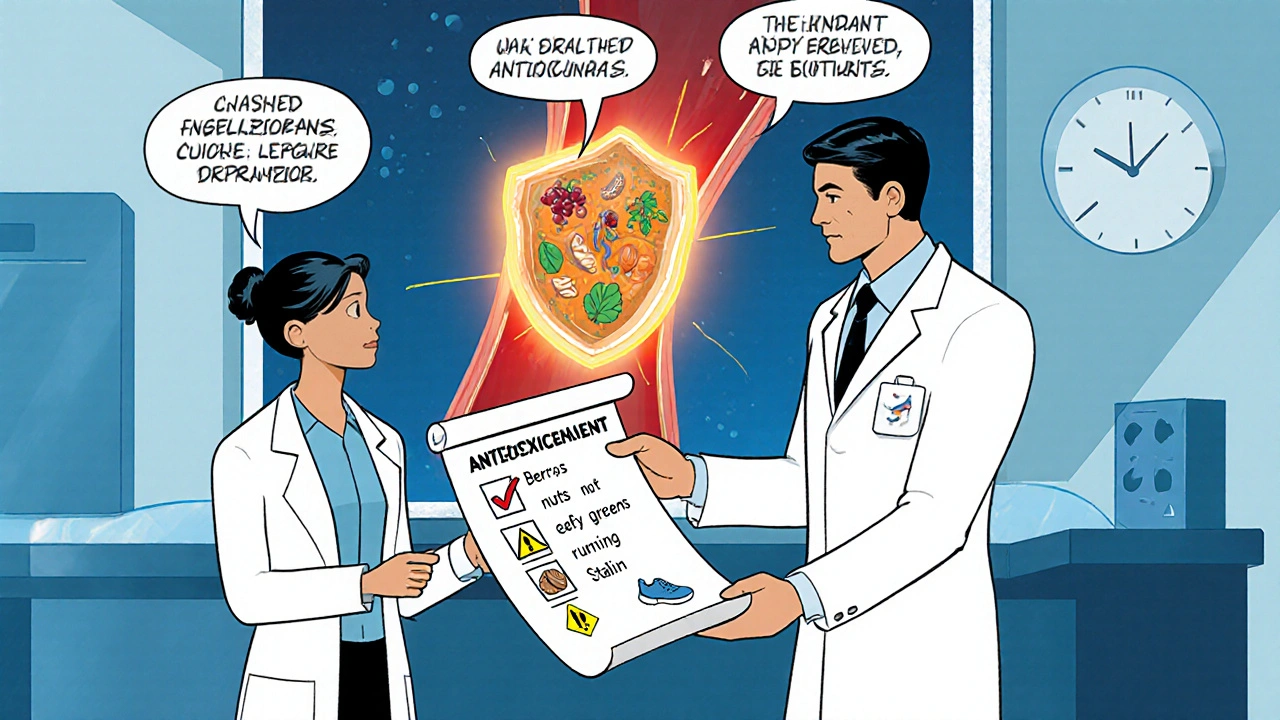
Potential Pitfalls and Drug Interactions
High‑dose antioxidant supplements can interfere with the efficacy of statins, the most common prescription for lowering LDL. For example, excessive vitaminE may reduce the muscle‑protective effect of some statins, increasing the risk of side‑effects.
People with bleeding disorders should be cautious with large amounts of vitaminE, as it can affect clotting. Always discuss supplementation with a healthcare professional, especially if you’re on medication.
Another common mistake is relying on a single antioxidant source. The body works best with a mix of compounds that act synergistically; a varied diet beats a megadose pill every time.
Checklist: Using Antioxidants to Manage LDL
- Include at least three antioxidant‑rich foods daily (e.g., berries, nuts, leafy greens).
- Prefer whole foods over isolated supplement pills unless advised by a doctor.
- Check with your physician if you’re taking statins or blood‑thinners before adding high‑dose supplements.
- Monitor your lipid panel every 3‑6months to gauge progress.
- Combine antioxidant intake with regular aerobic exercise and weight management for the strongest LDL‑lowering effect.
Frequently Asked Questions
Can antioxidants replace statin therapy?
No. Antioxidants can support heart health and modestly lower LDL, but statins remain the most effective medication for high‑risk patients. Use antioxidants as a complement, not a substitute.
How much vitaminC should I consume to see a benefit?
Around 90mg per day-roughly one medium orange or a cup of strawberries-covers the daily recommended intake and provides enough antioxidant capacity to help protect LDL from oxidation.
Are there any foods that actually increase LDL oxidation?
Highly processed foods rich in trans fats, refined sugars, and excessive omega‑6 oils can boost oxidative stress, making LDL more prone to oxidation. Cutting back on fried foods and sugary snacks helps keep LDL in its native form.
Is it safe to take vitaminE supplements daily?
For most adults, a modest dose (15mg or 22IU) from food or a low‑dose supplement is safe. Higher doses (>400IU) may increase bleeding risk and interfere with certain medications, so always check with a doctor.
What lifestyle changes boost the effect of antioxidants on LDL?
Regular aerobic exercise, maintaining a healthy weight, and avoiding smoking all lower oxidative stress. When these habits are combined with an antioxidant‑rich diet, LDL reductions are typically larger and more sustained.

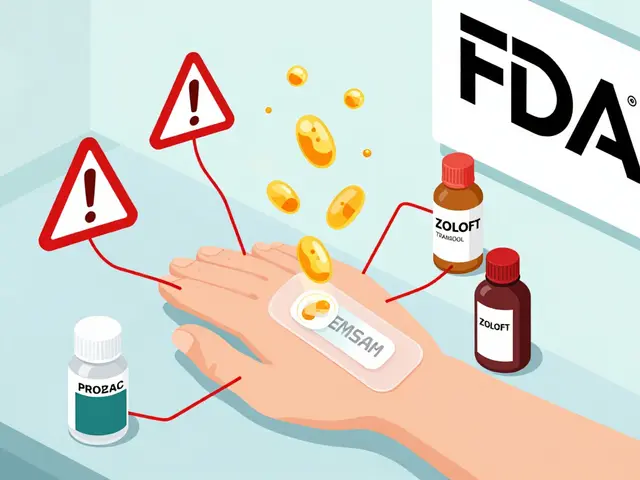
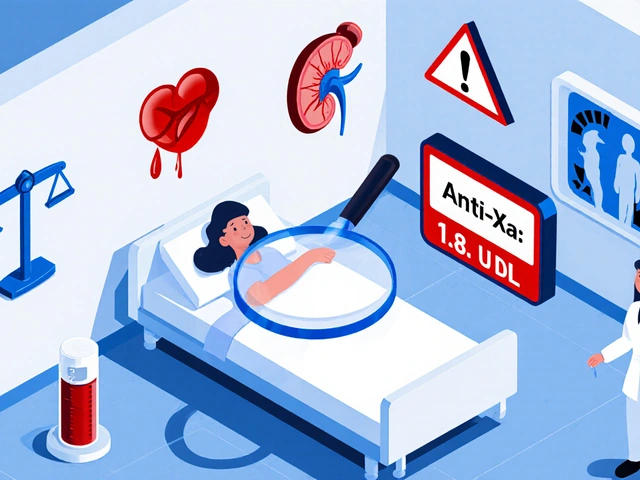

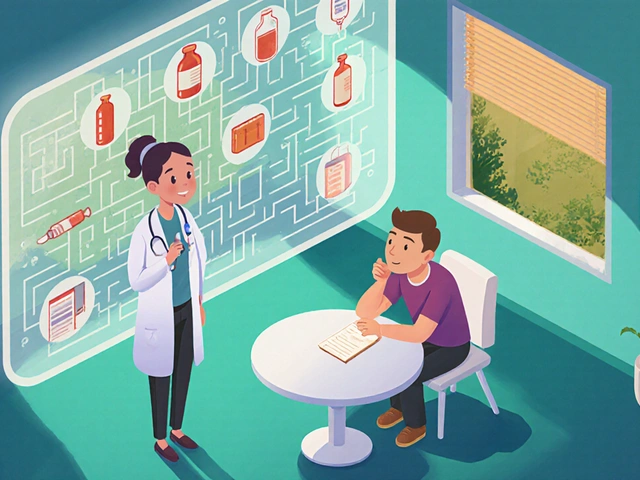
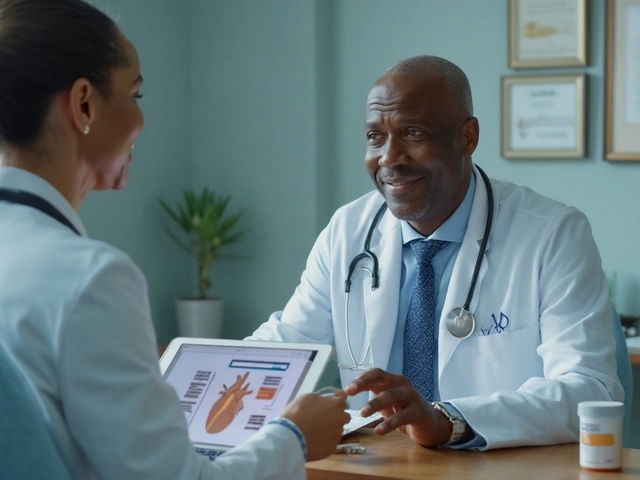
Comments (12)
Greg DiMedio
15 Oct 2025
Oh great, another miracle cure from the vitamin aisle.
Badal Patel
16 Oct 2025
Permit me, esteemed readers, to indulge in a most theatrical exposition: whilst the manuscript extols antioxidants as champions of cardiovascular health, it neglects to acknowledge the multifarious interplay of genetic predisposition, socioeconomic factors, and environmental stressors; thus, the narrative, though well‑intentioned, borders on reductive simplification. Moreover, the cited clinical trials, albeit robust, suffer from limited heterogeneity, thereby curtailing their external validity. You may, perchance, find solace in the data, yet I implore you to adopt a discerning gaze toward such medico‑scientific proclamations.
Kara Guilbert
18 Oct 2025
Honestly, it's just another way for big pharmas to push supplement sales on unsuspecting folks who think popping pills is a substitute for real health. The article barely mentions the danger of overdosing, and tbe whole "more is better" vibe is dangerous. People need to stop looking for shortcuts and start actually eating real food.
James Lee
19 Oct 2025
One could argue that antioxidants are the philosophers of biochemistry, seeking to neutralize chaos in our bloodstream. Yet, like a lazy critic, I question whether we truly need them or if it's just a trendy narrative to sell organic granola. The science is decent, but the hype feels overcooked.
Dennis Scholing
20 Oct 2025
Dear community, it is heartening to observe the growing interest in dietary antioxidants as adjuncts to cardiovascular health. May I recommend integrating a spectrum of orange‑colored vegetables, berries, and nuts into your weekly meals, whilst maintaining regular aerobic activity? Consistency, rather than occasional indulgence, yields the most appreciable benefits.
Kasey Lauren
21 Oct 2025
Great info! I love adding blueberries and dark chocolate to my snacks. It makes staying healthy feel tasty and easy.
joshua Dangerfield
22 Oct 2025
I feel you, man. Trying to make sense of all these numbers can be overwhelming, but remember that even small changes in diet can add up over time. Keep tracking your lipids and don't be afraid to tweak your meals.
Adele Joablife
23 Oct 2025
Your assessment of antioxidant supplementation is balanced, yet I would caution readers against assuming uniform efficacy across all polyphenol sources. The bioavailability of these compounds varies greatly depending on food matrix and individual gut flora. Therefore, personal experimentation, within clinical guidance, remains essential.
Peter Jones
25 Oct 2025
I agree with the nuanced view presented; it’s wise to consider individual variability when incorporating antioxidants into one’s regimen.
Gerard Parker
26 Oct 2025
Let me be blunt: if you’re already on statins, tossing extra antioxidants without consulting your physician can be risky. The interaction between high doses of vitamin E and certain anticoagulants is documented, and oxidative pathways are complex. Focus on whole‑food sources first, and reserve supplements for documented deficiencies.
Thomas Burke
27 Oct 2025
Nice summary.
Debbie Frapp
28 Oct 2025
Thank you for the thorough overview, and I’d like to expand on several points that merit deeper discussion. First, the role of oxidative stress in LDL modification is not merely a biochemical curiosity; it underpins the entire cascade of atherogenesis, influencing endothelial function and inflammatory cell recruitment. Second, while the cited trials demonstrate modest LDL reductions, the clinical significance of a 5‑10% change varies depending on baseline risk profiles. Third, it’s essential to recognize that antioxidant bioavailability differs dramatically between isolated supplements and whole foods, a factor often overlooked in meta‑analyses. Fourth, the interplay between antioxidants and statin therapy is bidirectional; some studies suggest statins themselves possess antioxidant properties, potentially attenuating the incremental benefit of additional agents. Fifth, dietary patterns rich in polyphenols-such as the Mediterranean diet-offer synergistic effects beyond isolated nutrients, including improvements in HDL functionality and blood pressure regulation. Sixth, the timing of antioxidant intake relative to meals can affect absorption; for instance, fat‑soluble vitamins are best consumed with dietary fats. Seventh, individual genetic polymorphisms, like variations in the APOE gene, may modulate response to antioxidant interventions. Eighth, lifestyle factors such as smoking cessation and regular exercise markedly reduce oxidative burden, sometimes eclipsing the impact of supplementation. Ninth, monitoring lipid panels every three to six months, as recommended, provides actionable feedback and helps tailor therapy. Tenth, patients should be wary of “mega‑doses” of antioxidants, as excess can paradoxically become pro‑oxidant. Eleventh, clinicians ought to assess dietary habits comprehensively before recommending supplements, ensuring that any additions complement rather than replace nutrient‑dense foods. Twelfth, emerging research on gut microbiota suggests that microbial metabolites of polyphenols may be key mediators of cardiovascular protection. Thirteenth, future investigations should aim for longer follow‑up periods to ascertain sustained LDL changes and cardiovascular outcomes. Fourteenth, public health messaging must balance enthusiasm for antioxidants with caution against over‑reliance on supplementation. Finally, the integration of personalized nutrition-leveraging genetic, metabolic, and lifestyle data-holds promise for optimizing antioxidant strategies in cardiovascular disease prevention.